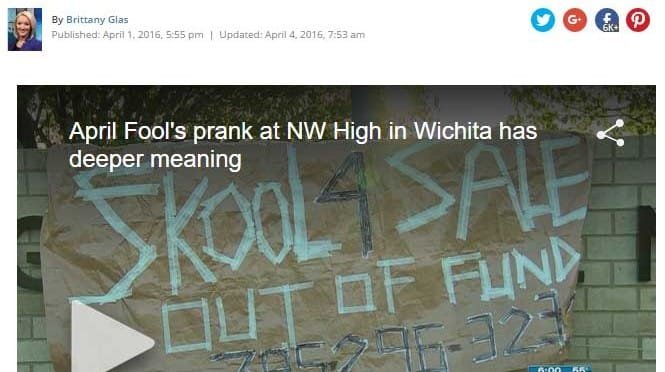Tag: Lynn Rogers
-

A look at a David Dennis campaign finance report
It’s interesting to look at campaign finance reports. Following, a few highlights on a report from David Dennis, a candidate for Sedgwick County Commission.
-

Northwest High prank, some underlying facts
Instead of pranking, Wichita public school students and their leaders might consider a few facts.
-
More parents unhappy with treatment by the Wichita school board
Parents are unhappy with their treatment by the Wichita school board. It’s not the first time.
-
Reaction to Kansas school lawsuit decision
Following are several reactions to the decision in Gannon vs. Kansas, the school funding lawsuit. The court ruled the state must spend more on schools.
-
Open records again an issue in Kansas
Responses to records requests made by Kansas Policy Institute are bringing attention to shortcomings in the Kansas Open Records Act.
-
Wichita school district discusses unspent fund balances
Last week the board of USD 259, the Wichita public school district provided another example of the attitude of the board towards those who have opinions that are not aligned with the policies of the district and public school spending advocates.
-
Wichita school fund balances again an issue
The issue of school fund balances in Wichita and Kansas is a serious issue that deserves discussion. At the same time, we need to make sure we don’t lose sight of Kansas school issues that are even more important. But school officials need to be held accountable for their deception of the public, most notably…
-
Wichita school board: critics not welcome
A recent meeting of the board of USD 259, the Wichita public school district, provided insight as to the insularity of the board members and district staff, and as to how little meaningful discussion or debate takes place at board meetings.
-
Wichita school district makes transparency effort
A recent transparency effort by USD 259, the Wichita public school district, is welcome, but we need to wait to see if the district’s past poor attitude towards open records can be reversed.
-
Kansas school spending lobby impossible to satisfy
A new report by the Kansas Policy Institute provides some insight into the voracious appetite of the Kansas school spending lobby for taxpayer dollars: There’s never enough.
-
On Wichita school board, are only supporters’ opinions welcome?
At this week’s meeting of the Wichita school district board, member Lynn Rogers criticized the Wichita Eagle for printing a story that include criticism by an opponent from the 2008 bond issue campaign without disclosing his involvement in that campaign.
-
Wichita school expulsions: the numbers
Recently a comment was left on this blog claiming that children in the Catholic school system who are problems are kicked out and end up in the public school systems. The writer didn’t make any claim as to the magnitude of the number of students, but readers are led to conclude that it’s enough to…